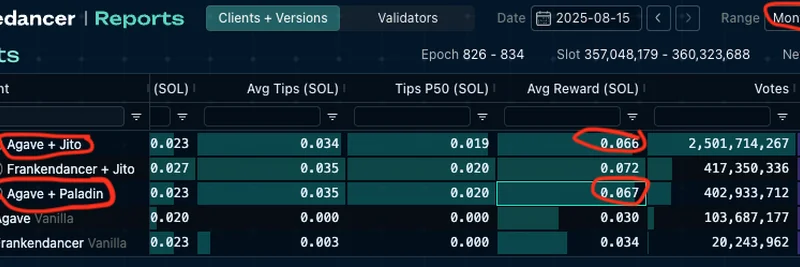If you're deep into the Solana ecosystem—especially if you're trading meme tokens like the rest of us—you've probably heard the buzz around validator clients and MEV (Maximal Extractable Value). These aren't just tech jargons; they directly affect transaction speeds, fees, and ultimately, your profits on those wild meme coin pumps. Recently, a tweet from Uri Klarman, CEO of bloXroute, caught everyone's attention by highlighting how their Paladin protocol is edging out the popular Jito in validator rewards.
The Tweet That Sparked the Conversation
On August 16, 2025, Klarman posted a screenshot from the Firedancer Reports dashboard, showing month-to-date rewards for various Solana validator clients. The key takeaway? Agave + Paladin is pulling in an average reward of 0.067 SOL, slightly beating out Agave + Jito at 0.066 SOL. He captioned it with a surprised "wait wat?" and tagged @paladin_solana and @jito_sol, teasing that "FD-Paladin" (Firedancer + Paladin) is coming soon.
This follows up on an earlier tweet from August 13, where he noted Paladin outperforming Jito over the last five days (0.071 SOL vs. 0.069 SOL).
For context, these dashboards come from Firedancer, Jump Crypto's high-performance Solana validator client designed to boost the network's throughput and resilience. It's still in development but already providing valuable insights into client performances.
Breaking Down Paladin and Jito: What's the Difference?
Let's keep this simple. Solana validators are the nodes that confirm transactions and secure the network. They earn rewards from base fees and tips (priority fees users pay to get their transactions processed faster). MEV comes into play when validators or searchers reorder transactions to extract extra value, like through arbitrage or sandwich attacks (where a trader fronts and backs your trade to profit from price slips).
Jito: Developed by Jito Labs, this is one of the most widely used MEV infrastructures on Solana. It runs an off-chain auction for block space, allowing searchers to bid for inclusion in bundles of transactions. Validators using Jito get a cut of these tips, making it a go-to for maximizing rewards. It's open-source and powers a lot of the network's efficiency, but it's not without critics who argue it centralizes MEV extraction.
Paladin: From bloXroute, Paladin is an open-source protocol that lets validators capture MEV directly without relying on external searchers as much. It focuses on protecting against harmful MEV like sandwich attacks while still boosting earnings through priority fee auctions. According to bloXroute's docs, Paladin validators can submit transactions directly for better inclusion rates. A recent analysis on Substack notes that while Paladin processes fewer transactions per block, it can lead to higher combined fees in certain scenarios.
The slight edge in rewards shown in the dashboards suggests Paladin might be more efficient for some setups, especially as the network evolves.
Why This Matters for Meme Token Enthusiasts
Solana is the playground for meme tokens—think Pump.fun launches, viral coins like $WIF or $BONK, and lightning-fast trades. But network congestion and high fees during hype cycles can kill the fun (and your gains). Better validator clients like Paladin or the upcoming Firedancer mean:
Lower Fees and Faster Transactions: Higher rewards incentivize more validators to adopt efficient clients, improving overall network performance. This could reduce failed transactions during meme token frenzies.
Fairer MEV Distribution: Paladin's approach to mitigating sandwich attacks protects retail traders (that's you and me) from predatory bots. If more validators switch, it might level the playing field against big players.
Staking Opportunities: If you're staking SOL via JitoSOL or similar, shifts in rewards could affect yields. Keep an eye on this if you're in liquid staking pools.
Plus, with "FD-Paladin" on the horizon—a combo of Firedancer's speed and Paladin's MEV smarts—we might see even bigger leaps. Firedancer aims for up to 1 million TPS (transactions per second), which would be a game-changer for high-volume meme trading.
Looking Ahead: Competition Heats Up in Solana's MEV Space
This isn't just a one-off win; it's part of a broader trend where multiple clients like Agave (the standard Solana client), Frankenstein (a hybrid), and newcomers are vying for dominance. Competition is healthy—it drives innovation and decentralization. For meme token projects building on Solana, adopting tools like Paladin could mean smoother launches and better user experiences.
If you're a validator or staker, check out the Firedancer GitHub for reports or dive into bloXroute's Trader API to experiment with Paladin. And for the latest scoops, follow influencers like @uriklarman on X.
What do you think—will Paladin dethrone Jito, or is this just a blip? Drop your thoughts in the comments, and stay tuned to Meme Insider for more updates on Solana's evolving tech landscape.



